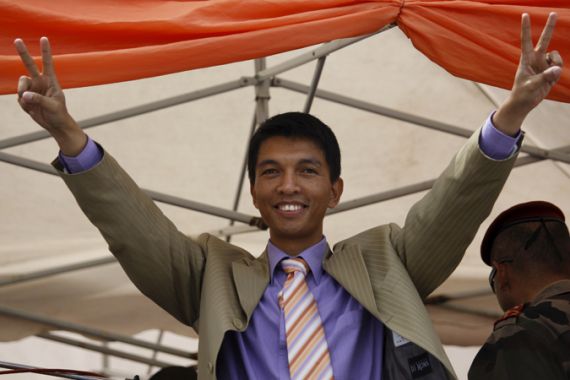Madagascar votes in key referendum
Polls open in Madagascar for referendum on new constitution, seen as test of confidence on president Rajoelina.

 |
| Rajoelina has been president since March 2009 after seizing power in a military-backed coup [File: EPA] |
Polls have opened in Madagascar for a referendum on a new constitution, seen as a test of confidence on Andry Rajoelina, the current president.
Antananarivo, the capital, was calm on Wednesday morning after minor disturbances overnight, including a fire set at the offices of a party close to Rajoelina. No one was injured.
Rajoelina, who has been in power for more than a year after seizing power in a military-backed coup, could have his rule legitimised by the vote which the three main opposition parties have urged the public to boycott.
A change put forward in the new constitution states that the leader of the so-called High-Transitional Authority – that Rajoelina heads – will keep power until the election of a new president.
This could lead to Rajoelina keeping his position indefinitely, Johary Ravaloson, a writer and legal expert said.
“Because he’s set no date for stepping down, nor spelled out conditions for the next elections,” Ravaloson said.
About seven million people are registered to vote and a holiday was called so people could go to the polls.
Political stalemate
The nation of 20 million has been at political stalemate, with violence occasionally flaring, since Rajoelina’s takeover sent Marc Ravalomanana, the fromer president, into exile in South Africa. Rajoelina has refused to allow Ravalomanana to return.
In August, a court established by Rajoelina convicted Ravalomanana in absentia of conspiracy to commit murder and sentenced him to life in prison in a case related to the turmoil of the coup that toppled him.
Supporters of Ravalomanana and two other former presidents have called for a boycott of the vote.
Raharinaivo Andrianatoandro, the president of a transitional legislature established by Rajoelina, said those who don’t vote “have failed to understand the importance of this process”.
Rajoelina accuses Ravalomanana, a wealthy businessman, of misuse of office and of being blind to poverty on the island famous for lemurs and other wildlife found nowhere else in the world, and the inspiration for two animated films of the same name.
Ravalomanana says his rival, a disc jockey-turned-entrepreneur, is a populist and rabble-rouser with little genuine interest in democracy.
Ravalomanana went from peddling yogurt from a bicycle to running a multimillion dollar food and broadcasting empire but Rajoelina was able to portray him as interested primarily in enriching himself.
Rajoelina himself owns radio and TV stations and is from the wealthy elite that has long dominated politics on the island.
Since independence from France in 1960, Madagascar has struggled to establish stability and democracy, with the army deeply involved in its politics.
Ecotourism, vanilla production and the recent discovery of oil have failed to lift the majority of Madagascar’s population from poverty.